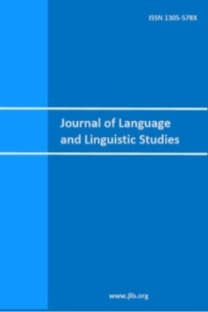Pre-service EFL teachers' conceptions of language proficiency: Entry and exit level qualifications
English as a Foreign Language; pre-service EFL teachers; language; language proficiency; English language proficiency
___
Bachman, L. F. (1990). Fundamental considerations in language testing. Oxford: Oxford University Press.Butler, Y. G. (2004). What level of English proficiency do elementary school teachers need to attain to teach EFL? Case studies from Korea, Taiwan, and Japan. Tesol Quarterly, 38(2), 245-278.
Ceulemans, C., Simons, M., & Struyf, E. (2012). Professional standards for teachers: How do they ‘work’? An experiment in tracing standardisation in-the-making in teacher education. Pedagogy, Culture & Society, 20(1), 29-47.
Da Silva, M. (2005). Constructing the Teaching Process from Inside Out: How Pre-Service Teachers Make Sense of Their Perceptions of the Teaching of the Four Skills. TESL-EJ, 9(2), n2.
Darling-Hammond, L. (2006). Constructing 21st-Century teacher education. Journal of Teacher Education,57(3), 300-314. doi: 10.1177/0022487105285962
Dincer, A., & Yesilyurt, S. (2013). Pre-service English teachers’ beliefs on speaking skill based on motivational orientations. English Language Teaching, 6(7), 88.
Farrell, TS., & Richards, J.C. (2007) Teachers’ language proficiency. In: Farrell TS (ed.) Reflective Language Teaching: From Research to Practice. London: Continuum, 55–66.
Freeman, D., Katz, A., Gomez, G., & Burns, A. (2015) English for teaching: Rethinking teacher proficiency in the classroom. ELT Journal 69(2): 129–39.
Gibbs, R. & Holt, R. (2003) The teaching of international languages in New Zealand schools in Years 7 and 8: an evaluation study. Report to the Ministry of Education. Auckland: Auckland University of Technology.
Jahin, J. H. (2012). The Effect of Peer Reviewing on Writing Apprehension and Essay Writing Ability of Prospective EFL Teachers. Australian Journal of Teacher Education, 37(11), n11.
Kurt, G., & Atay, D. (2007). The Effects of Peer Feedback on the Writing Anxiety of Prospective Turkish Teachers of EFL. Online Submission, 3(1), 12-23.
Murdoch, G. (1994). Language development provisions in teacher training curricula.ELT Journal, 48(3), 253–265.
Pachler, N., Evans, M., & Lawes, S. (2007). Modern foreign languages: Teaching school subjects 11-19. Routledge.
Richards, JC. (2015) Key Issues in Language Teaching. Cambridge: Cambridge University Press.
Shin, S. (2008). Preparing non-native English speaking ESL teachers. Teacher Development 12, no. 1: 57-65. doi:10.1080/13664530701827749
Tercanlioglu, L. (2001). Pre-service teachers as readers and future teachers of EFL reading. Tesl-ej, 5(3), 1-17.
Vinuesa, M. D. (2015). General English or English for academic purposes? Revising the approaches for core language instruction in English studies. Revista de Lenguas para Fines Específicos, 8, 71-82.
Yüksel, H. G. (2014). Teachers of the future: Perceived teaching competences and visions of pre-service English language teachers. International Journal of Human Sciences, 11(2), 27-39. doi: 10.14687/ijhs.v11i2.2920
- ISSN: 1305-578X
- Yayın Aralığı: Yılda 4 Sayı
- Yayıncı: Hacettepe Üniversitesi
A content analysis on articles related to English (L2) pronunciation teaching
Seden ERALDEMİR TUYAN, Ergün SERİNDAĞ
The acquisition and use of negation in the early child language
Examining the use of picture books in preschool education institutions
Atiye ADAK ÖZDEMİR, Filiz HIDIR, Burcu ÖZDEMİR BECEREN
The effect of phonetic transcription on Iranian EFL students' word stress learning
Examination on the use of emoticon technique as a communication tool for narrative skills
